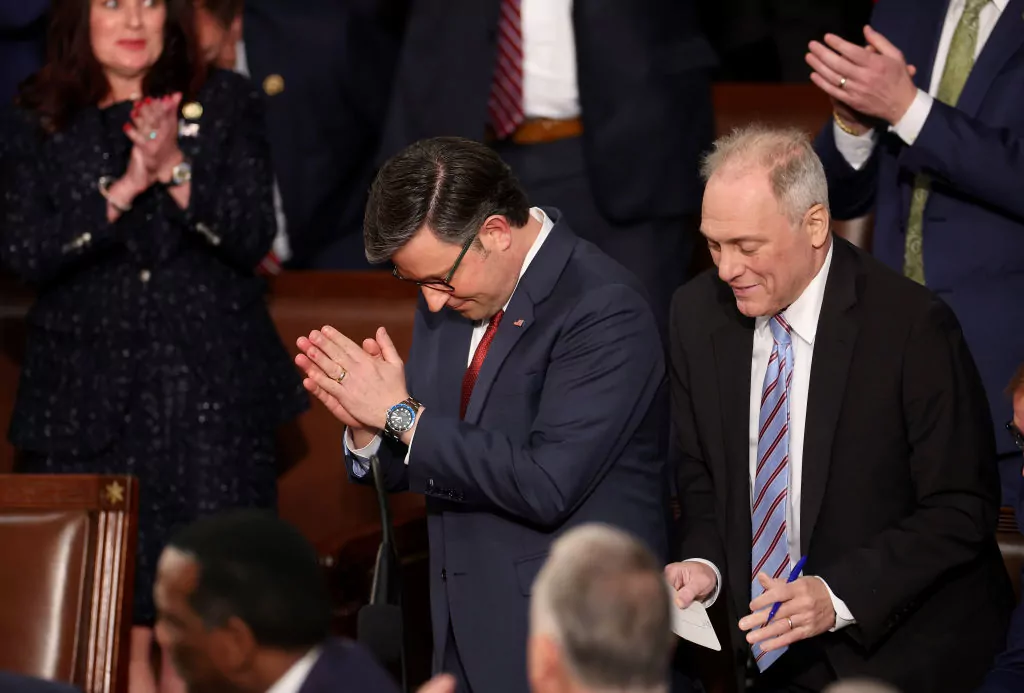

But after a series of conversations with two key holdouts, Reps. Ralph Norman (R-SC) and Keith Self (R-TX), the pair flipped their votes, giving Johnson the 218 he needed to be reelected.
Johnson offered assurances to lawmakers to help secure their backing, according to lawmakers familiar with the conversations. During those discussions, Johnson promised that rank-and-file Republicans would have a role in negotiations over the budget reconciliation packages expected in President-elect Donald Trump’s first year.
“My sole focus was advancing the Trump agenda. To ensure this, I expressed concerns to Speaker Johnson about fiscal responsibility and holding the line on deficit spending — key priorities for my constituents,” Self, who initially voted for Rep. Byron Donalds (R-FL), said in a post on X.
“He gave us the assurance and we trust him,” Norman, who voted for Judiciary Chairman Jim Jordan (R-OH) at first, told reporters.
Still, Johnson maintained that he did not make side deals or concessions to win votes, telling reporters on Friday afternoon that he simply “reaffirmed” to reluctant Republicans that the GOP-controlled House would cut spending and empower members.
Johnson did not acquiesce to the sort of demands made of Kevin McCarthy, who gave conservatives outsize sway to win the speaker’s gavel in 2021. This time around, hard-line members unsuccessfully floated the idea of Rep. Chip Roy (R-TX) becoming chairman of the powerful Rules Committee.
The details of the rules that will govern the 119th Congress were still being finalized, however, after the speaker vote ended on Friday, with last-minute changes to weaken Johnson’s ability to move legislation outside of regular order.
Johnson also released three commitments for a second term, including the creation of a working group composed of independent experts to work with the Department of Government Efficiency to implement spending reforms.
He promised to task House committees with conducting “aggressive” authorizations and appropriations reviews “to expose irresponsible or illegal practices” within agencies as well.
“If we want to restore fiscal responsibility, we must start by being transparent about the dollars that are spent, address the issues we find, and then hold those accountable who have misspent funds,” Johnson said in a statement ahead of the vote. “Republicans have a mandate to implement the America First agenda, and as Speaker, this will be my priority.”
Johnson is not out of the woods entirely with his right flank. The conservative Freedom Caucus offered a warning to Johnson after the election was over, stating, “There is always room to negotiate on so-called ‘leadership’ positions under the rules.”
“In the meantime, each one of our election certificates is still equal,” members wrote in a joint letter. “Personalities can be debated later, but right now, there is no zero room for error on the policies the American people demanded when they voted for President Trump — the ones necessary to save our country.”
The acquiescence from members of the Freedom Caucus, who have repeatedly accused Johnson of betraying conservative values on must-pass legislation, nonetheless suggests the sway of President-elect Donald Trump, who repeatedly endorsed his speakership in the days and hours leading up to the speaker election.
The president-elect also reportedly called Norman and Self on Friday after they voted against Johnson, helping soften their resistance.
Freedom Caucus members also noted that Trump played a major role in their decision, claiming they voted for Johnson because of their “steadfast support” of the president-elect and to ensure “the timely certification” of his 2024 election win on Monday.
CLICK HERE TO READ MORE FROM THE WASHINGTON EXAMINER
Johnson also got help from other Republican lawmakers, such as Reps. Andy Ogles (R-TN) and Nancy Mace (R-SC), who spoke with holdouts to help convince them to change their votes.
After Norman and Self flipped to yeses on Johnson, he managed to win the speaker’s gavel on the first roll call — something GOP leaders predicted earlier Friday morning.
The outcome allows Johnson to begin the 119th Congress on a less chaotic note than his predecessor McCarthy, who didn’t secure the speakership until after 15 rounds of voting over four days.
Even then, McCarthy had to make a number of side deals that ended with his eventual ouster.






